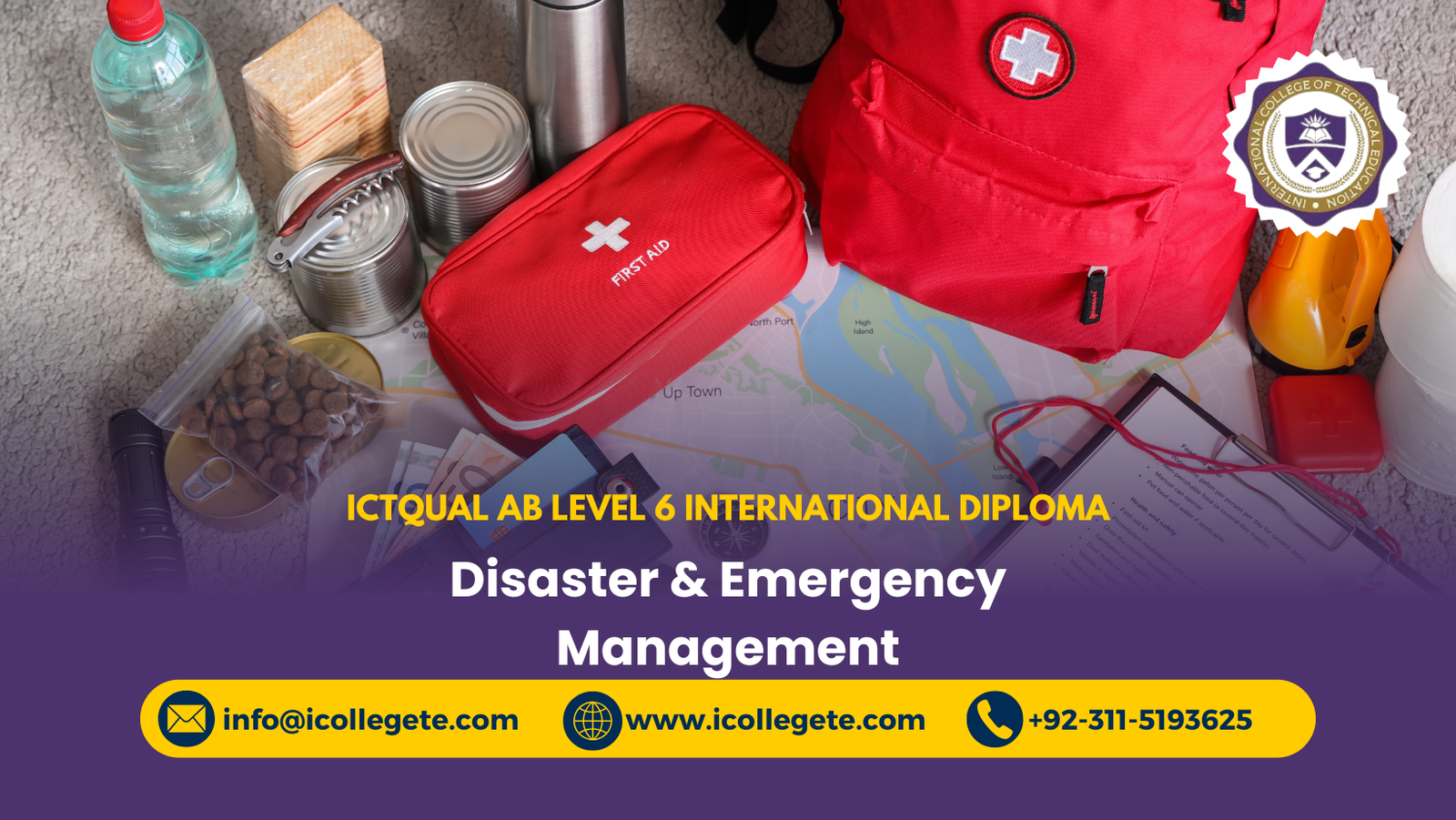The ICTQual AB Level 6 International Diploma in Disaster & Emergency Management is a globally recognized qualification designed to prepare learners with the advanced knowledge, skills, and leadership capabilities required to manage disasters and emergency situations effectively. ICTQual AB Level 6 International Diploma in Disaster & Emergency Management three‑year, 360‑credit program provides a comprehensive foundation in disaster preparedness, response, recovery, and resilience planning, making it an essential pathway for those committed to safeguarding communities and organizations in times of crisis.
Throughout the ICTQual AB Level 6 International Diploma in Disaster & Emergency Management , learners will explore critical areas such as disaster risk assessment, emergency response strategies, crisis communication, business continuity, and resilience frameworks. The curriculum integrates theoretical instruction with practical applications, including case studies, simulation exercises, and scenario‑based learning, ensuring that graduates are equipped to handle both natural and human‑induced emergencies.
ICTQual AB Level 6 International Diploma in Disaster & Emergency Management is ideal for students, professionals, and community leaders who aspire to build careers in emergency management, humanitarian response, public safety, and disaster risk reduction. ICTQual AB Level 6 International Diploma in Disaster & Emergency Management also provides a clear academic progression route to Level 7 Postgraduate Diplomas and Master’s programs in Disaster Management, Public Policy, or International Development.
Year 1 – Foundations of Disaster & Emergency Management
- Introduction to Disaster and Emergency Management
- Types and Causes of Disasters
- Principles of Risk Assessment and Management
- Emergency Planning and Preparedness
- Crisis Communication and Stakeholder Engagement
- Introduction to Humanitarian Response
- Disaster Legislation, Policies, and Governance
- Environmental Impacts of Disasters
- Resource Management in Emergency Situations
- Introduction to Project Management in Disaster Response
- Health and Safety in Disaster Management
- Ethical Considerations in Emergency Operations
Year 2 – Applied Disaster & Emergency Management Practices
- Advanced Risk Assessment and Vulnerability Analysis
- Disaster Mitigation Strategies
- Emergency Operations and Response Coordination
- Incident Command Systems and Leadership
- Humanitarian Logistics and Supply Chain Management
- Community Preparedness and Awareness Programmes
- Disaster Recovery and Rehabilitation Planning
- Crisis Management for Organisations and Institutions
- Use of Technology and Digital Tools in Disaster Management
- Environmental Sustainability in Disaster Operations
- Applied Research Methods in Disaster Management
- Operational Planning and Simulation Exercises
Year 3 – Strategic Leadership in Disaster & Emergency Management
- Strategic Leadership in Disaster Management
- International Disaster Management Frameworks and Standards
- Policy Development and Regulatory Compliance
- Advanced Crisis and Risk Communication
- Disaster Resilience and Business Continuity Planning
- Climate Change and Disaster Risk Reduction
- Emergency Preparedness for Critical Infrastructure
- Governance, Ethics, and Accountability in Disaster Management
- Innovation and Emerging Technologies in Emergency Response
- Strategic Planning and Resource Mobilisation
- Independent Research Project in Disaster & Emergency Management
- Capstone Project: Applied Disaster & Emergency Management
Year 1 – Foundations of Disaster & Emergency Management
1. Introduction to Disaster and Emergency Management
- Explain the fundamental concepts, objectives, and scope of disaster and emergency management.
- Identify key stakeholders and their roles in disaster response.
2. Types and Causes of Disasters
- Analyse natural, technological, and human-induced disasters.
- Assess the primary causes and potential impacts of various disaster types.
3. Principles of Risk Assessment and Management
- Conduct basic risk assessments for organisations and communities.
- Develop strategies to mitigate and manage potential hazards.
4. Emergency Planning and Preparedness
- Design emergency preparedness plans for different scenarios.
- Identify resources, roles, and responsibilities in emergency planning.
5. Crisis Communication and Stakeholder Engagement
- Develop effective communication strategies during emergencies.
- Engage stakeholders to support disaster preparedness and response.
6. Introduction to Humanitarian Response
- Explain the principles of humanitarian aid and disaster relief.
- Evaluate organisational structures involved in emergency humanitarian support.
7. Disaster Legislation, Policies, and Governance
- Analyse national and international disaster management legislation.
- Apply governance frameworks to ensure compliance and ethical practice.
8. Environmental Impacts of Disasters
- Assess environmental consequences of disasters.
- Propose measures to reduce ecological damage during and after emergencies.
9. Resource Management in Emergency Situations
- Manage personnel, equipment, and logistical resources effectively.
- Prioritise resources according to disaster severity and operational needs.
10. Introduction to Project Management in Disaster Response
- Plan and execute small-scale disaster management projects.
- Monitor project performance and ensure alignment with objectives.
11. Health and Safety in Disaster Management
- Identify health and safety risks in emergency operations.
- Implement measures to protect responders and affected communities.
12. Ethical Considerations in Emergency Operations
- Apply ethical principles in decision-making during disasters.
- Ensure accountability and transparency in disaster response activities.
Year 2 – Applied Disaster & Emergency Management Practices
1. Advanced Risk Assessment and Vulnerability Analysis
- Conduct in-depth risk assessments for communities and organisations.
- Identify vulnerabilities and propose targeted mitigation strategies.
2. Disaster Mitigation Strategies
- Develop and implement disaster mitigation plans.
- Evaluate the effectiveness of preventive measures and interventions.
3. Emergency Operations and Response Coordination
- Coordinate multi-agency disaster response operations.
- Apply incident command principles to ensure efficient resource use.
4. Incident Command Systems and Leadership
- Lead operational teams during emergencies using structured command systems.
- Make critical decisions under pressure to maintain operational effectiveness.
5. Humanitarian Logistics and Supply Chain Management
- Plan and manage logistics for relief distribution and emergency supplies.
- Optimise supply chain processes to enhance disaster response efficiency.
6. Community Preparedness and Awareness Programmes
- Design and deliver disaster awareness campaigns.
- Engage communities to promote preparedness and resilience.
7. Disaster Recovery and Rehabilitation Planning
- Develop recovery plans to restore infrastructure and services.
- Implement rehabilitation strategies for affected populations.
8. Crisis Management for Organisations and Institutions
- Develop organisational crisis management frameworks.
- Ensure business continuity during and after emergencies.
9. Use of Technology and Digital Tools in Disaster Management
- Utilise GIS, early warning systems, and digital tools for disaster monitoring.
- Analyse data to inform response planning and decision-making.
10. Environmental Sustainability in Disaster Operations
- Integrate sustainability principles into disaster response activities.
- Minimise environmental impact during operations and recovery.
11. Applied Research Methods in Disaster Management
- Apply research methodologies to evaluate disaster management practices.
- Analyse data to support evidence-based decision-making.
12. Operational Planning and Simulation Exercises
- Develop detailed operational plans for simulated disaster scenarios.
- Evaluate performance and identify areas for improvement.
Year 3 – Strategic Leadership in Disaster & Emergency Management
1. Strategic Leadership in Disaster Management
- Lead organisational strategies in disaster preparedness and response.
- Develop policies and procedures that enhance operational resilience.
2. International Disaster Management Frameworks and Standards
- Analyse international standards and frameworks in disaster management.
- Ensure organisational alignment with global best practices.
3. Policy Development and Regulatory Compliance
- Develop disaster management policies aligned with legislation.
- Monitor and enforce compliance with relevant regulations.
4. Advanced Crisis and Risk Communication
- Develop comprehensive crisis communication strategies.
- Manage communication across multiple channels and stakeholders.
5. Disaster Resilience and Business Continuity Planning
- Design strategies to enhance organisational and community resilience.
- Implement business continuity plans to minimise disruption during emergencies.
6. Climate Change and Disaster Risk Reduction
- Assess the impact of climate change on disaster risk.
- Develop adaptation and mitigation strategies to reduce vulnerability.
7. Emergency Preparedness for Critical Infrastructure
- Plan for the protection of critical infrastructure during disasters.
- Conduct risk assessments and implement mitigation measures.
8. Governance, Ethics, and Accountability in Disaster Management
- Apply ethical leadership and governance principles in emergency operations.
- Ensure transparency, accountability, and compliance in decision-making.
9. Innovation and Emerging Technologies in Emergency Response
- Evaluate and apply emerging technologies to enhance disaster management.
- Integrate innovative solutions to improve response efficiency and effectiveness.
10. Strategic Planning and Resource Mobilisation
- Plan large-scale emergency operations and allocate resources effectively.
- Coordinate multi-agency responses to complex disaster scenarios.
11. Independent Research Project in Disaster & Emergency Management
- Conduct independent research on a relevant topic in disaster management.
- Present findings and evidence-based recommendations for practical application.
12. Capstone Project: Applied Disaster & Emergency Management
- Integrate knowledge and skills from all units into a comprehensive applied project.
- Demonstrate strategic planning, operational execution, and leadership in disaster scenarios.
Academic Excellence and Recognition
- Earn a globally recognized Level 6 qualification in Disaster & Emergency Management
- Gain advanced knowledge of disaster preparedness, response, recovery, and resilience planning
- Study a curriculum aligned with international academic and professional standards
- Build a strong academic foundation for postgraduate diplomas and master’s programs
- Enhance your academic profile for teaching, training, and research opportunities
Career Advancement Opportunities
- Open pathways to careers in disaster management, humanitarian response, and emergency services
- Qualify for roles such as disaster risk manager, emergency planner, or crisis response coordinator
- Strengthen employability in government agencies, NGOs, and international organizations
- Gain practical skills that employers value, including risk assessment and crisis communication
- Position yourself for leadership roles in public safety, resilience planning, and emergency operations
Practical and Technical Skills Development
- Learn to conduct disaster risk assessments and vulnerability analyses
- Master emergency response strategies, crisis communication, and business continuity planning
- Apply resilience frameworks to real‑world disaster and emergency scenarios
- Gain hands‑on expertise through case studies, simulations, and scenario‑based learning
- Develop operational plans for disaster preparedness, mitigation, and recovery
Global and Ethical Perspective
- Understand international disaster management policies, frameworks, and compliance standards
- Explore the role of humanitarian response in achieving the UN Sustainable Development Goals (SDGs)
- Promote ethical practices in disaster relief, recovery, and community resilience
- Build awareness of climate change, sustainability, and global disaster risk reduction strategies
- Prepare to contribute to international disaster response and resilience initiatives
Personal and Professional Growth
- Strengthen leadership, project management, and decision‑making skills
- Improve communication and coordination abilities for high‑pressure emergency situations
- Gain confidence to work in diverse, multicultural, and global environments
- Develop problem‑solving and analytical skills for complex disaster scenarios
- Build a career that combines academic achievement with meaningful humanitarian impact
- Students and Fresh Graduates
- Learners aiming to build a career in disaster management, emergency response, and humanitarian services
- Students seeking an internationally recognized Level 6 qualification to strengthen their academic profile
- Graduates planning to progress toward postgraduate diplomas or master’s programs in disaster management, public policy, or international development
- Individuals passionate about crisis management, public safety, and community resilience
- Emergency and Corporate Professionals
- Professionals working in emergency services, disaster management agencies, or humanitarian organizations
- Corporate employees in risk management, business continuity, or health and safety roles
- Consultants and managers seeking to expand expertise in crisis planning and resilience strategies
- Technical staff and engineers aiming to specialize in disaster risk reduction and emergency operations
- Government and Public Sector Employees
- Civil servants and policymakers working in ministries of disaster management, interior, or public safety
- Municipal officers responsible for disaster preparedness, emergency planning, or crisis response
- Regulators and administrators involved in national disaster risk reduction frameworks
- Public sector employees preparing for senior roles in emergency governance and resilience planning
- NGO and Humanitarian Workers
- NGO professionals engaged in disaster relief, humanitarian aid, and community development projects
- Leaders working on grassroots initiatives for disaster preparedness and recovery
- Advocates promoting disaster risk reduction, resilience, and sustainable development goals (SDGs)
- Community organizers aiming to implement effective emergency response strategies
- Academics and Researchers
- Educators and trainers in disaster management, emergency planning, and humanitarian studies
- Researchers focusing on disaster risk reduction, resilience frameworks, and crisis communication
- Scholars preparing for doctoral research in disaster management, public safety, or humanitarian response
- Academic professionals seeking to integrate global disaster management practices into teaching and research










